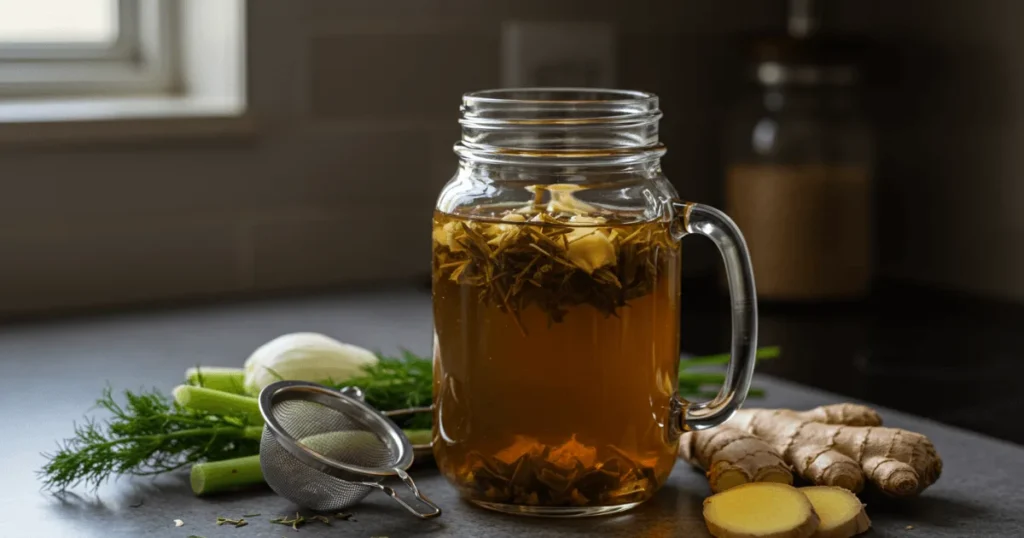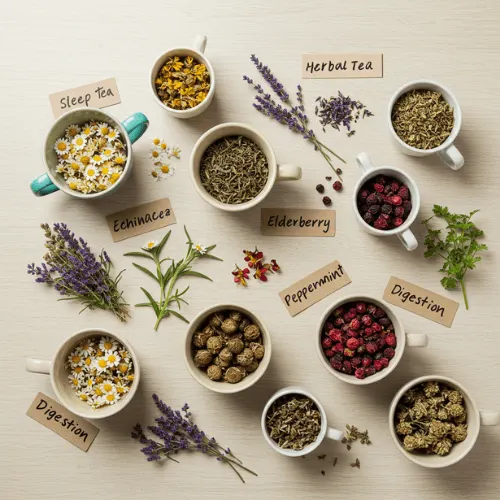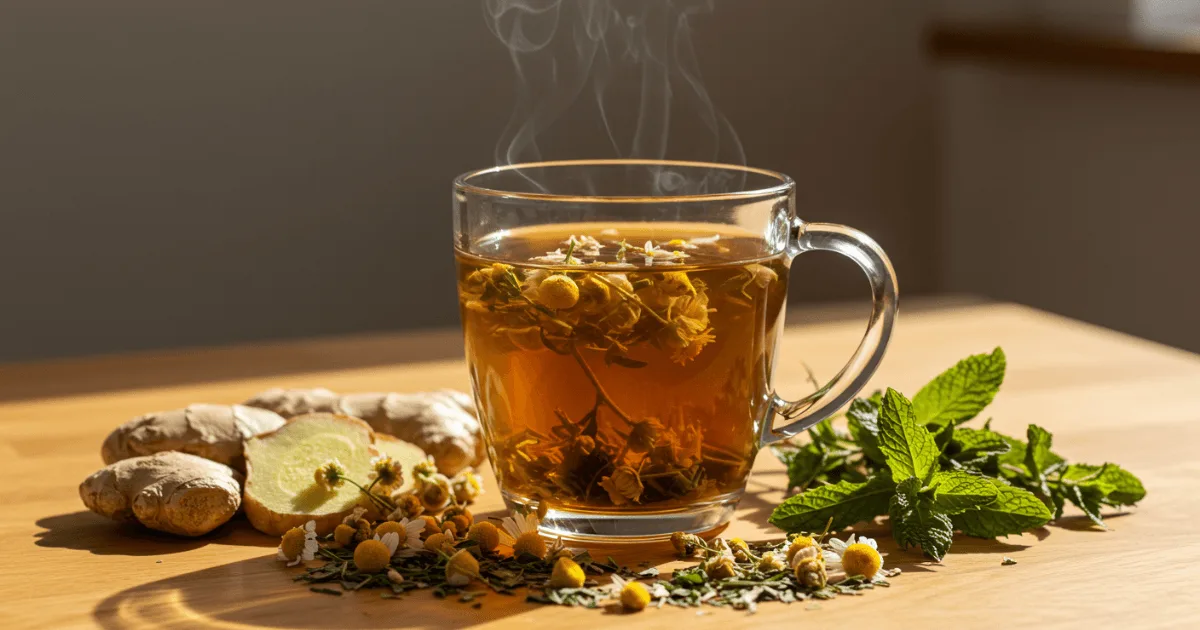Okay, full disclosure—I used to think herbal tea drinkers were a special breed of people who had their entire lives together. You know the type: morning meditators, meal-prepping warriors who somehow make drinking hot leaf water look cool. During this period, I relied on iced coffee and my willpower to keep going.
Then life happened. I was overwhelmed with stress, my stomach revolted, and my caffeine consumption left me feeling both drained and on edge. When my yoga-loving friend suggested herbal tea, I nearly laughed in her face.
Table of Contents
But desperation breeds strange habits.
Fast forward six months, and now I’m that weirdo with twelve different tea blends in my cupboard. Just to clarify, I haven’t suddenly turned into a wellness sage. I just accidentally discovered that this stuff works. And the best part? It’s way easier than adulting should be. Turns out our ancestors might have been onto something with this whole “plants as medicine” thing.
What Even Is Herbal Tea?
Here’s something that blew my mind: most “herbal teas” aren’t technically tea at all. True tea comes from the Camellia sinensis plant—green, black, oolong, etc. Herbal teas? These are assortments of flowers, roots, bark, seeds, and leaves collected from a variety of plant species.
We’re talking chamomile flowers, ginger root, fennel seeds; someone raided a garden and made everything drinkable. And thank goodness they did, because each one has its little superpower.
Initially, I believed it was just marketing hype. I then observed how distinct types of tea influenced my feelings. Maybe there’s something to this whole “plants as medicine” thing our grandparents swore by.
Why I Stuck with It?
Let’s be honest—health benefits alone wouldn’t have converted me. What hooked me first?
- No caffeine (most herbal teas). I could drink it at 8 PM without lying awake until 2 AM questioning my life choices.
- No calories, in contrast to the sweet drinks I was drinking.
- The ritual—forcing myself to slow down for five minutes was therapy for my anxious brain.
But the real clincher? These plants have been used for medicinal reasons by people for millennia. If they worked before modern medicine, maybe there’s something to them.

The 10 Benefits That Made Me a Believer
I used to think herbal tea was just hot leaf water for people who liked pretending to be fancy. I was wrong. After years of trial, error, and a few questionable-tasting experiments, here’s exactly how herbal teas changed my health, with zero BS.
1. Your Digestive System Will Stop Hating You
My Before: A stomach that treated tacos like a personal attack. I carried Tums like they were breath mints.
What Works (& What Doesn’t):
- Peppermint Tea – The fastest relief for bloating/cramps. Pro tip: Chug it warm—cold doesn’t work as well. Downside: It can worsen acid reflux for some.
- Ginger Tea – Better than Dramamine for nausea. Hack: Steep fresh ginger (not powder) for max potency. Warning: Too much = heartburn.
- Fennel Tea – Tastes similar to licorice (not appealing), yet it deflates bloating swiftly like a balloon being pricked.
- Chamomile – The “Xanax of teas” for IBS stress flares. Key: Brew for 10+ mins—weak tea = weak results.
2. Immune System Backup
My Before: Caught every office plague. Now? I’m the weirdo handing out tea bags instead of germs.
Top Picks:
- Echinacea – Tastes like wet dirt, but shortens colds if taken at the first sniffle. Skip it if you have ragweed allergies.
- Elderberry – The only tea that tastes like candy. Science says it may block viruses—I just like that it doesn’t suck.
- Ginseng – Subtle energy + immune boost. Critical: Buy real ginseng (cheap stuff = fake).
- Green Tea – Not herbal, but the EGCG (fancy antioxidant) nukes germs. Pro move: Add lemon to boost absorption.
3. Stress Relief That Works
My Before: Chronic overthinker. Now? I drink tea instead of doomscrolling.
Best Bang-for-Buck Stress Teas:
- Chamomile – The #1 for anxiety. Fun fact: It binds to the same brain receptors as Valium (but gentler).
- Lemon Balm – Tastes like mild mint, reduces cortisol. Hack: Mix with chamomile for mega-calm.
- Ashwagandha – Tastes like dirt, but after 2 weeks daily, my “stress threshold” got higher. Must: Brew with honey.
- Lavender – Smells amazing, tastes like soap (at first). Workaround: Add a tiny bit of maple syrup.
4. Brain Fog Be Gone
My Before: Relied on coffee, then crashed by 3 PM. Now? Herbal teas = steady focus.
Winners:
- Peppermint – The scent alone sharpens focus. Office hack: Keep a bag at your desk to sniff during meetings.
- Ginkgo Biloba – Mild memory boost (studies show it helps blood flow to the brain). Warning: Don’t take with blood thinners.
- Ginger – Increases circulation = clearer thinking. Bonus: Also helps with motion sickness.
5. Natural Pain Relief
My Before: Popped ibuprofen like candy. Now? Tea + stretching = fewer pills.
Best for Pain:
- Peppermint – Tension headaches and period cramps. Key: Sip slowly + apply a cold compress.
- Turmeric – Anti-inflammatory powerhouse. Non-negotiable: Add black pepper (boosts absorption 20x).
- Chamomile – Long-term, reduces chronic pain (thanks to apigenin). Tip: Drink nightly for cumulative effects.
6. Heart Health
My Before: Family history of high BP. Now? Hibiscus tea keeps my numbers in check.
Cardio Stars:
- Hibiscus – Lowers BP as effectively as some meds (study-backed). Taste hack: Iced with lime = tart & refreshing.
- Rooibos – Packed with heart-healthy antioxidants. Bonus: Naturally sweet (no sugar needed).
7. Gentle Detox
My Before: Fell for “detox tea” scams. Now? Real herbal teas = actual liver/kidney support.
Smart Choices:
- Dandelion Root – Mild diuretic (helps bloating). Tastes like: Earthy coffee. Avoid if on diuretic meds.
- Hydration – Herbal teas = an easy way to drink more water. Pro tip: Rotate flavors to avoid palate fatigue.
8. Weight Management
My Before: Drank soda like water. Now? Herbal teas curb sugar cravings.
Best for Appetite:
- Peppermint – Suppresses cravings (smelling it helps too).
- Rooibos – Sweet, vanilla-like flavor = dessert substitute.
9. Allergy Relief
My Before: Sneezed through spring. Now? Nettle tea = natural antihistamine.
Allergy Aids:
- Nettle – Reduces histamines. Tastes like: Spinach water (but works).
- Peppermint – Clears sinuses (steam + menthol).
10. Bone Health
My Before: Never thought about bones until my doc warned me. Now? Nettle tea = mineral boost.
Bone-Builders:
- Horsetail – Silica for collagen (but don’t drink long-term—can be hard on kidneys).
- Nettle – High in calcium, magnesium.


How to Make Herbal Tea
No fancy rules—just:
- Utilize 1 teaspoon of loose tea or a single tea bag for every cup.
- Pour boiling water over it.
- Steep 15+ minutes (can’t overdo it).
- Strain & drink.
Pro tips:
- Reuse leaves for a second cup.
- Brew strong for iced tea.
- Start with short steeping times for new flavors.
Let’s Keep It Real About Herbal Tea
Alright, full disclosure—I’m a total herbal tea fan, but I’m not here to sell you fairy tales. It’s not a cure-all, and yeah, there are a few things to watch out for.
First off, talk to your doc if you’re on meds, pregnant, or dealing with health issues. I get it, it sounds overly cautious for something as simple as tea, but herbs can be sneaky. Some don’t mix well with prescriptions, and others might not be safe for certain conditions. No shame in double-checking.
Not all tea brands are trustworthy. Regrettably, certain manufacturers apply ambiguous labels to their products, neglect contamination testing, or promise unrealistic health benefits. Your best bet? Stick with well-known brands, lean organic when you can, and ignore anything that claims to “detox your soul” or whatever.
More isn’t always better. Chugging a whole pot of herbal tea daily might backfire. Stuff like licorice root can mess with your blood pressure, and overdoing certain blends could stress your liver or kidneys. Approach it as you would coffee—appreciate it, but don’t overindulge.
Slow your roll with new flavors. Once, I went wild and tried like five new teas in a week. Big mistake. Couldn’t tell if one was helping my sleep or if another was making me jittery. Now I test them one at a time—way smarter.
Why This Matters (It’s Not Just About Tea)
Honestly, what hooked me on herbal tea wasn’t just the taste—it taught me to listen to my body for the first time. When you start sipping different teas for different reasons, you suddenly notice things you used to ignore.
Like realizing Sunday nights always left me wired with anxiety. Or that my stomach hated certain foods. Or—plot twist—I was a walking raisin because coffee and wine don’t count as hydration (who knew?).
Herbal tea became my low-key self-care hack. No pressure to be perfect, no fancy wellness rituals—just simple choices that make a difference. Some days it’s ginger for nausea, others it’s hibiscus just because it’s pretty.
And there’s something weirdly empowering about having natural fixes up your sleeve. Headache? Peppermint tea first, pills second. Stressed? Chamomile’s a hug in a mug. It’s like building your little first-aid kit, but cozier.
The Bottom Line (From a Former Skeptic)
You don’t need to overhaul your life. Just pick one issue (sleep, stress, digestion) and try the tea that helps. Even if it’s a placebo effect (I don’t think so), you’re still hydrating, pausing, and practicing self-care—and in this chaotic world, that’s not nothing.
So grab some chamomile or peppermint tea. Your future well-rested, less-stressed, happier gut self will thank you.

